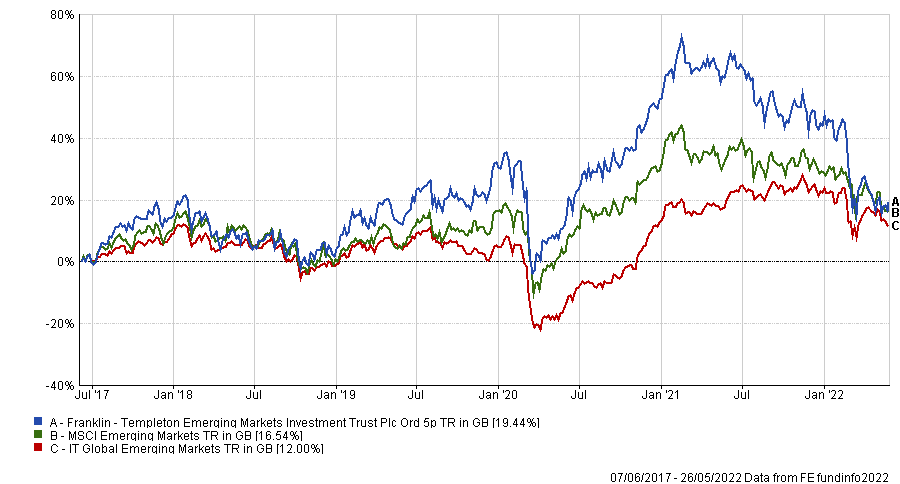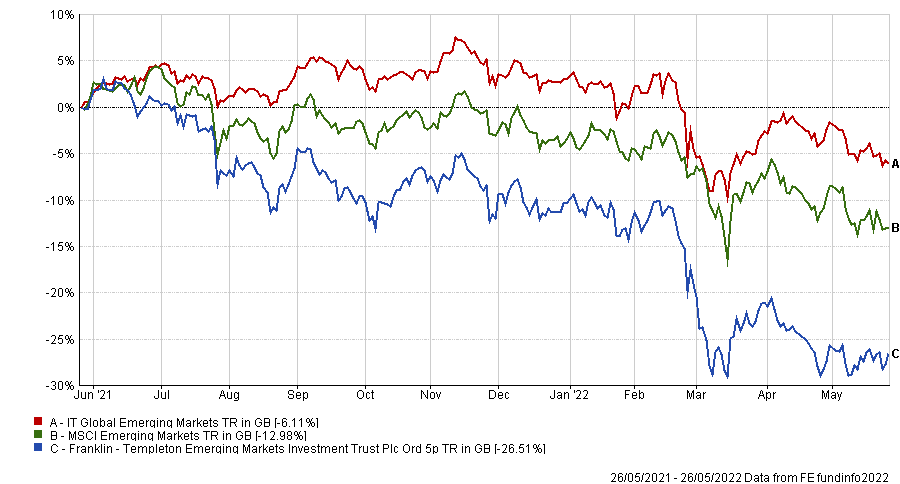Investing in emerging markets has been difficult for many managers over the past few years, but perhaps none more so than Chetan Sehgal, co-manager of the Templeton Emerging Markets Investment Trust (TEMIT).
Sehgal took charge of the trust from Carlos Hardenberg, who left to join renowned investor Mark Mobius (who ran the portfolio before him) in his new venture.
Since Sehgal has been at the helm the portfolio has performed well, up 19.4% and beating the MSCI Emerging Markets benchmark (16.5%) and the average IT Global Emerging Markets peer (12%).
Performance of trust vs sector and benchmark since manager start

Source: FE Analytics
However, the events of the past few years have caught the trust out somewhat. Indeed, over one year it is down 26.5%, more than double the index and four times worse than the average peer.
Below, Sehgal explains how his picks in China and an overweight to Russia have impacted returns and why a Chinese stock called Health and Happiness has offered no joy so far.
What is your process for picking stocks?
We look for companies that have sustainable earning power and buy them at a discount to what we think they are worth.
Our portfolio has more profitable companies than the index, so the return on assets is better than the index, they have less leverage, are growing in-line with the market and are on valuations that are broadly in line.
We are looking at all-cap opportunities and the source of our ideas is from local researchers in these markets. We have more than 40 different offices and everyone feeds in new ideas.
Why should investors pick your fund?
The first question should be: Why emerging markets? Fundamentally they offer so much. They have the lowest-cost producers of commodities, the largest consumer bases and many of the leaders of technology are there. There are so many reasons to buy emerging markets.
More specifically to us, the trust has a long track record of performance and we have done consistently well against the index. There have been short periods where we have not done so well, but we have outperformed over the long term while providing positive alpha as well as positive returns.
Why has recent performance been so poor?
The first reason is the internet regulations in China, which started towards the end of 2020 when the Ant Financial IPO was stopped. This started playing out in terms of earnings in June 2021. Some of it was competition but some of it was pure regulation.
In 2021 there was also the US which imposed sanctions on Chinese companies. They were put on a list which meant you could not own them. You could not have expected a telecom or oil company to be put on the list. We were forced sellers, even though the share prices of some companies are much higher now than they were.
The second was the Russia-Ukraine situation, which has changed the demand and supply for commodities. We had significant exposure to Russia as it was a value market. Companies were paying more than 10% in dividend yields and until the last day before the war these businesses were buying back shares.
One encouraging thing though is if you took our portfolio from the end of 2020 and did nothing, despite the forced selling and other impacts, we are better off. But the actions we have taken have clearly not been enough.
Performance of trust vs sector and benchmark over 1yr

Source: FE Analytics
What about the future?
We are focusing on structural stories. The past few years have been about dislocations and some of that will be temporary. For example, if Europe is serious about weaning itself away from energy and focusing on renewables, our portfolio is well positioned.
What have been your best and worst stock picks in recent years?
One of the best has been ICICI Bank. We bought it at a time when there was a churn in management taking place in the bank and there was a lot of corporate governance allegations pertaining to the previous chief executive.
We had the courage to buy the stock, as we thought the company was focusing on the right things and it has done very well. That has more than doubled – and nearly tripled – since we bought it.
One stock that has not done well for us is Health and Happiness. It did not give us any happiness. It has dropped significantly, more than halving.
The company was making infant formula in China, which was profitable. China used to have 20 million births per year, but that has halved in the past five years, while there has been more competition and regulation, so demand has been impacted.
It then moved on and bought Procter & Gamble’s vitamin business, which imported goods from Australia but because of Covid the vitamins trade was impacted.
The company came out of all of that and last year bought a pet nutrition business supplying nutritional supplements.
We still own the company because we believe the management has not financed the company in the right way but understand the dynamic behind wanting to move the company into another area.
As long as there aren’t corporate governance issues, you are still okay because you are just going through the cycle.
Do you incorporate environmental, social and governance (ESG) into your trust?
We have an Article 9 fund, but in this one it all flows from the G. If you have the right governance in place, then the companies will also be working towards the E and the S.
The question is whether you follow an exclusion agenda or corporate change. In most cases we will try to work with management on change and we have very few red lines.
Even if we have exposure to a cement company, which can be polluting, we will focus on those that have the lowest carbon emissions. By doing this we have managed to keep our carbon intensity lower than the index.
What are your hobbies outside of fund management?
I read a lot, especially history, and play sport. I used to be a good player of ping pong but I have started picking up tennis more recently.





